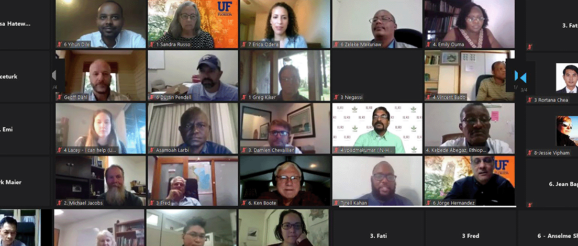Zoom-tastic Innovation Platforms Prove Popular and Efficient

The COVID-19 pandemic forced many in-person events into virtual formats, including the five 2021 Innovation Platform (IP) meetings for our five current target countries. Would these events be successful, given the potential for technical challenges, and could they continue the progress from previous years when we met in person?
Due to the pandemic, we cancelled the planned in-person IP meetings for 2020. Should we cancel once again? Eager to stay connected with our stakeholders in the target countries, we decided on a new virtual format.
These 2021 virtual IP meetings would also be a first opportunity to share plans for Phase II, because our main USAID award had been extended by an additional five years in October 2020. An invitation email to the meetings stated it this way:
“Phase II research will build on the findings from the Phase I, address gaps, and consider the livestock sector and consumption of animal-source food related research priorities identified by the national governments, USAID, as well as other stakeholders in country. In Phase II, we are seeking deeper engagement with the private sector as well as with producer organizations, industry associations, and civil society.”
Ready to Zoom
Although an in-person introduction to Phase II may have been preferable, we pursued the idea of IP meetings with some confidence based on past experience. For years, our Management Entity core at the University of Florida relied on weekly virtual team meetings on Zoom to get updates from our coordinators in our target countries. We had also hosted many virtual webinars and stakeholder meetings online, and our Virtual Annual General Meeting at the end of September 2020 received strong positive reviews. So we felt we were ready for this virtual IP format.
Our country coordinators facilitated recruitment of participants to attend. Many stakeholders know them personally and regard them highly as trustworthy and dependable research partners. These relationships were based on years of direct person-to-person contact and cannot be replaced.
Month of Meetings
The five meetings were scheduled across a three-week period. Past Innovation Platform meetings have attracted approximately 20 to 50 attendees, but participation at these virtual sessions was similar or higher. The 2021 IP meetings and their Zoom attendance levels were:
- Nepal: March 16, 49 participants
- Ethiopia: March 23, 51 participants
- Niger: March 25, 49 participants
- Rwanda: March 31, 74 participants
- Burkina Faso: April 7, 55 participants
Part of the noticeable increase was from staff and faculty of our Innovation Lab, who otherwise would not travel to attend IP meetings. Clearly, access is much wider, and costs are much lower with an online format.
Sharing Key Results
The objectives across the five meetings were the same: to share key research findings from Phase I, describe research and local capacity development plans for Phase II, and to inform prospective applicants about the forthcoming Request for Applications in 2021. A major difference from the in-person meetings was that individual projects did not make presentations; instead, the Management Entity summarized findings from Phase I and presented plans for Phase II. This allowed us to reduce the typical day-long format into two hours—a manageable length for a single online session.
Chats continued throughout the meetings, and participants were given at least four chances for their chat questions to be answered live by the presenters. For the section on Local Capacity Development, stakeholders were invited to contribute to a Google document to show their interest in co-creating a target country’s roadmap. Near the end, all participants were encouraged to respond to the forthcoming Request for Applications.
Did the virtual format succeed? A short online survey at the end of the event brought near unanimous agreement that the event was very valuable. More than 80% of respondents across several countries and measures found the meetings useful and relevant for ideas that they could apply to their work. Given the advantages of an online format, will IP meetings return to in-person events in the coming years? Certainly, the experience has given us food for thought, and we will be assessing the costs and benefits as new opportunities arise.
